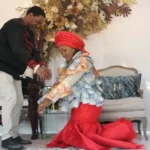The recent dismissal of Deputy Minister of Higher and Tertiary Education, Simelisizwe Sibanda from the office of Higher and Tertiary Education, Innovation, Science, and Technology Development has taken a new twist. The former deputy minister has now issued a public apology after realising that he has supposedly messed up with President Emmerson Mnangwana who then fired him with immediate effect.
Sibanda’s apology comes after a fierce backlash following his decision to transfer an Early Childhood Development (ECD) teacher in Bubi District where he is a member of parliament, due to her alleged lack of proficiency in the iSiNdebele language. President Mnangagwa’s swift action in removing Sibanda from his position must have made Sibanda realise that he has messed up big time and began executing his damage control process.
Speaking out for the first time since his dismissal, Sibanda expressed his apologies, acknowledging the misguided nature of his approach and the unintended consequences it had on tribal relations. “I, Honourable Simelisizwe Sibanda, former Deputy Minister of Higher and Tertiary Education, do hereby express my sincere apologies for the concerns arising from my recent actions,” he stated.
“I understand that my approach to addressing the issue of a teacher’s language proficiency was misguided and inappropriate, leading to perceptions of tribalism,” Sibanda admitted in a public apology, his words echoing with a sense of regret and a desperate attempt to salvage his tarnished reputation.
“I want to assure the public and especially the teachers that my intention was solely to ensure that our children receive quality education, and I was concerned about the teacher’s ability to communicate effectively with her students,” he added, attempting to justify his actions by highlighting his concern for the children’s education.
However, his explanation fell flat, failing to appease the public who saw his actions as a blatant disregard for diversity and inclusivity. The incident has reignited a long-standing debate about the role of language in education and the importance of embracing cultural differences.
“As a national leader, I realize that I should have addressed the issue through appropriate channels, and avoiding public platforms that may have fueled the tribal connotations,” Sibanda confessed, acknowledging his misjudgment and the potential damage caused by his actions.
He also expressed remorse for his actions, stating: “I understand that my actions may have perpetuated tribal divisions, and for that, I truly apologise to the whole teaching fraternity and nation at large.”
Sibanda’s apology, though heartfelt, has been met with mixed reactions. While some have accepted his apology, others remain unconvinced, questioning the sincerity of his remorse and the extent of his understanding of the gravity of his actions.
The sacking of the minister was announced in a Monday statement by Chief Secretary to the President and Cabinet Martin Rushwaya.
“His Excellency the President of the Republic of Zimbabwe Cde. Dr. Emmerson D. Mnangagwa has, in terms of Section 108 (1a) of the Constitution of Zimbabwe removed Honourable Simelisizwe Sibanda from the Office of Deputy Minister of Higher and Tertiary Education, Innovation, Science and Technology Development with immediate effect,” Rushwaya said without giving any reasons, as is usually the case.












